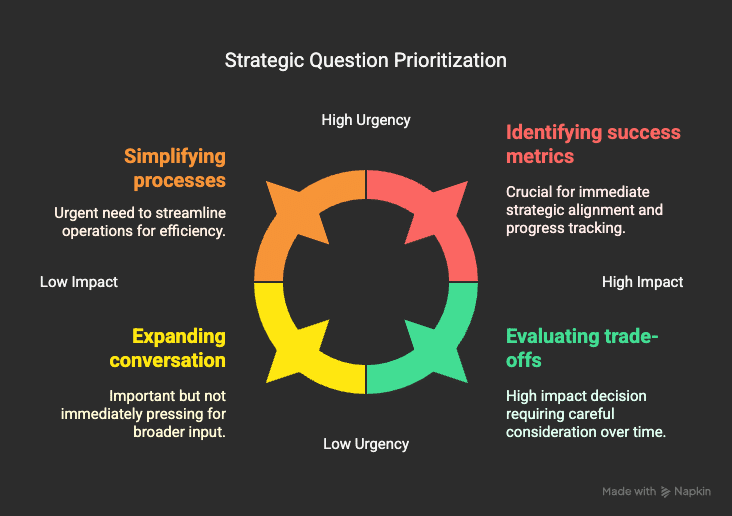Business coaching questions aren’t just prompts—they’re power tools. The right question, asked at the right time, can shift a team from confusion to clarity, from stagnation to strategy. While traditional leadership leans on answers and authority, modern high-performing teams thrive under a different approach: inquiry-driven leadership.
At Champion PSI, we work with executives and organizations across North America to integrate business coaching questions into their leadership rhythm—driving not just better decisions, but better alignment, trust, and momentum.
According to Harvard Business Review, the most effective leaders ask smarter questions, not because they lack answers, but because they know questions open doors answers often can’t.
Overview: What You’ll Learn
Business coaching questions are the secret weapon of strategic leaders. In this blog, we’ll explore:
- Why business coaching questions outperform directives in today’s leadership landscape
- How to use them across real business scenarios
- A real-world case study from Microsoft’s culture transformation
- Five tactical FAQs for implementation
Here are the 7 essential business coaching questions we’ll unpack:
- What does success actually look like for you?
- Where are we overcomplicating things?
- What’s getting in your way right now?
- How are we measuring progress?
- What’s one thing we could do differently this week?
- Who else needs to be part of this conversation?
- If we say yes to this, what are we saying no to?
1. What does success actually look like for you?
Success is often assumed, rarely defined—and almost never agreed upon without asking this first.
Use this business coaching question when:
- Launching a new initiative
- Re-aligning a leadership team
- Reviewing performance or OKRs
Follow it up with: “How will we know we’ve succeeded in 90 days?” and “What would success feel like on a personal level?” These additions turn vague goals into measurable, emotionally grounded outcomes.
Want more clarity around building shared definitions? Explore our internal guide to creating alignment in teams.
2. Where are we overcomplicating things?
Most teams don’t suffer from laziness—they suffer from layers. Extra approvals. Redundant systems. Misaligned metrics. This question is a scalpel for cutting the fat.
Use it when:
- Projects stall or stall again
- Process feels bloated
- People are busy but not productive
Ask: “If we had to do this in half the time, what would we eliminate first?” As McKinsey’s learning culture research shows, empowered teams execute better when they’re trusted to simplify.
3. What’s getting in your way right now?
Most blockers go unspoken until they become chronic. This question opens the valve.
Use it during:
- Weekly one-on-ones
- Mid-project retrospectives
- Performance check-ins
Look out for vague complaints. Gently probe with: “If you could remove one thing today, what would shift?” The point isn’t to solve everything—it’s to make the friction visible.
Teams that normalize naming blockers build stronger trust. As we teach through our executive coaching, strong culture starts with candor.
4. How are we measuring progress?
Without metrics, momentum becomes illusion. This question brings it back to substance.
Use this business coaching question when:
- Launching new strategies
- Reviewing KPIs
- Mid-quarter pivots
The most common mistake? Measuring what’s easy, not what matters. Ask: “What would we expect to see if this is working?” and “How will we know we’re slipping early?”
As Gallup explains in their leadership research, progress tied to purpose—not just performance—drives sustainable engagement.
5. What’s one thing we could do differently this week?
Small changes done consistently outperform big overhauls done sporadically. This question builds iteration into the rhythm.
Use it:
- At the end of weekly team meetings
- In retros
- During Friday debriefs
Ask: “What’s the lowest-lift experiment we could try?” It doesn’t have to be complex. One subtle tweak in communication, feedback loops, or decision cadence can compound fast.
Teams that adopt this question develop what Champion PSI coaching clients often call a “culture of evolution”—an environment that learns and adapts faster than the competition.
6. Who else needs to be part of this conversation?
If decisions consistently surprise or frustrate stakeholders, chances are you’re not asking this question early enough.
Use it:
- While scoping projects
- When repeated friction occurs
- Before sending cross-functional updates
Ask: “Who will be most impacted by this—and have they had a chance to weigh in?” This builds lateral trust, increases buy-in, and prevents late-game blockers.
Want more on this? See our breakdown on organizational clarity, where we explain how to build decision-making systems that include the right voices from the start.
7. If we say yes to this, what are we saying no to?
Without trade-offs, strategy dissolves into wishlists. This question forces the hard—but crucial—decisions.
Use it:
- In quarterly planning
- Before greenlighting new work
- Anytime scope is creeping
Ask: “What will break if we do this?” or “What will have to wait?” If the answer is “nothing,” you’ve got a focus problem.
BCG’s executive coaching analysis emphasizes this exact pattern: leaders who ask better trade-off questions execute better over time—and model discernment for their teams.

Case Study: How Microsoft Rebuilt Its Culture with Questions
In 2014, Microsoft was struggling with stagnation, internal silos, and a reputation for rigidity. Satya Nadella’s appointment as CEO marked a turning point—not because he launched new products, but because he asked new questions.
Nadella initiated a company-wide shift from a “know-it-all” culture to a “learn-it-all” culture. Managers were coached to listen more, ask often, and reframe conflict through inquiry. They were given the tools to ask better business coaching questions.
According to Fortune, one of his first mandates wasn’t technical—it was cultural. “What did you learn this week?” became a leadership norm. Reflective questions replaced status updates.
A few pivotal examples:
- “Who’s missing from this decision?” improved inclusivity.
- “What’s the friction here?” restructured slow product loops.
- “Why are we still doing this?” cut failing legacy projects.
The results were staggering. Microsoft’s market value tripled. Employee engagement rose. Cross-team collaboration accelerated.
Business Insider and AP News both highlight how Nadella’s question-based leadership model didn’t just shift culture—it became a case study in modern transformation.
Frequently Asked Questions
What are good questions to ask a business coach?
Some powerful ones include:
- “What blind spots am I missing?”
- “Where do I consistently stall?”
- “What’s the behavior behind the result?”
As HBR outlines, the best coaching questions move you from insight to action—not just reflection.
When should I use business coaching questions?
Use them everywhere:
- One-on-ones
- Team huddles
- Slack threads
- Strategic planning
McKinsey found that inquiry-driven cultures outperform those built on command-and-control by a wide margin.
Can these really improve culture?
Yes—and fast. When teams are asked to think, rather than just do, they start to engage more meaningfully. Reflection becomes normalized. Communication becomes more real.
Want to build a reflection-driven team culture? Champion PSI coaching services are designed to make it tangible, trackable, and scalable.
How many business coaching questions should I use at once?
Just one or two. The goal isn’t volume. It’s depth.
Let the silence breathe. Let the question land. Then move from there.
What if my team resists?
Resistance often means the question is real. Don’t retreat. Get curious.
Name the discomfort. Make space for honesty. Culture changes not when people agree—but when they feel safe enough to engage.
Conclusion: 7 Essential Business Coaching Questions to Inspire Your Team
If you want to transform the way your team thinks, feels, and performs—don’t default to giving answers. Lead with better business coaching questions.
From alignment to innovation, simplicity to execution, these questions aren’t just tactical—they’re cultural. They embed reflection into the fabric of your organization. They build leaders at every level.
Want help integrating this approach into your leadership rhythm? Book a free 30-minute call with a Champion PSI coach and let’s turn questions into breakthroughs.










